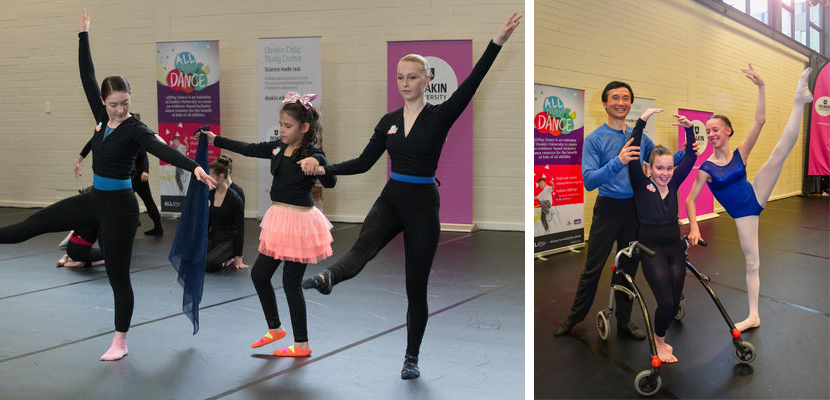Hundreds of children with disabilities around the nation are set to have support to participate in dance – and gain from the many benefits dance provides.
Deakin University has launched Australia’s first comprehensive digital resource to promote inclusion in dance for children with developmental challenges, as well as a directory of inclusive dance schools.
An initiative of Deakin’s Child Study Centre within the School of Psychology, AllPlay Dance includes a suite of online resources to help children, their parents and dance teachers ensure that dance schools are an inclusive space for kids of all abilities.
The initiative is an expansion of the ground-breaking AllPlay program, a national project that aims to make the world fit for all kids. It was launched last year with AllPlay Footy, a collaboration with the AFL and Moose Toys that is encouraging more kids with disabilities to join their local NAB AFL Auskick program – and has seen hundreds of children signing up.
AllPlay creator and Director of the Deakin Child Study Centre, Professor Nicole Rinehart said children with developmental challenges, such as autism, ADHD, cerebral palsy, language disorders and intellectual disabilities, often feel their disabilities are a barrier to participating in group activities.
[testimonial_text]AllPlay Dance is about opening up opportunities to all children who want to express themselves through dance, get moving with a local dance group, or just have fun with their friends on the dancefloor. It can be used in all types of dance classes, from hip hop, to jazz, to cultural, to ballet.[/testimonial_text]
[testimonial_picture name=”Professor Nicole Rinehart” details=”Deakin Child Study Centre Director”]
 [/testimonial_picture]
[/testimonial_picture]“Our research shows that being part of these kinds of group activities has such a positive impact on children’s physical development and their social development, including their sense of belonging in the community.”
Carly Stewart is one parent who has seen the benefits of dance for her child. “My son Lachie absolutely adored it,” she said. “He was very excited to come in and join in and have a go himself.”
Professor Rinehart explained that there are many simple changes dance schools can make to enable inclusion. These include improving access to the venue, modifying some dance exercises and routines, adapting equipment or allowing an aide or caregiver to attend the class and help the child.
At the recent launch of AllPlay Dance, Queensland Ballet’s Artistic Director Li Cunxin, author of the book “Mao’s Last Dancer,” conducted a special masterclass for a group of children with disabilities.
“We firmly believe in the power ballet has to create positive change, provide opportunity and bring people together,” Mr Cunxin said.
AllPlay Dance will have a positive impact on the lives of children of all abilities.
“Our involvement in programs such as this furthers our aim to share the gift of ballet with as many people as possible. We look forward to seeing the joy this program will bring to many children with disabilities and their families.”
AllPlay Dance was funded by a grant from the National Disability Insurance Agency (NDIA), through its Information, Linkages and Capacity Building (ILC) grant program, which aims to make the broader community more inclusive for people with disabilities.
Dance schools, parents and children can learn more at: www.allplaydance.org.au and www.allplay.org.au
Main Photograph, from left: Mr Li Cunxin, Artist Director of Queensland Ballet, Allplay dancer Bridget Healy, and elite dancer Morgan Renolds.
Published by Deakin Research on 10 October 2018




